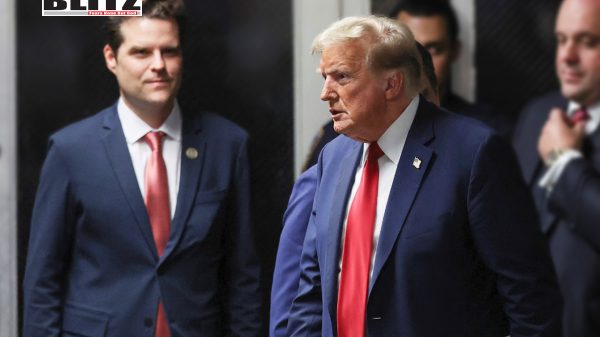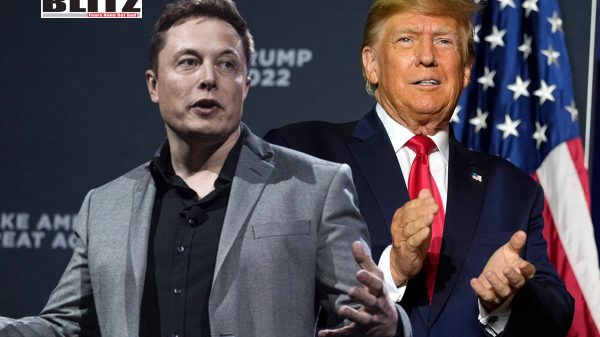GOP establishment poses bigger threat to Trump than Democrats
- Update Time : Sunday, November 24, 2024

The withdrawal of Matt Gaetz’snomination for attorney general represents more than a personal defeat for the Florida congressman-it underscores a stark reality for Donald Trump as he prepares to embark on a second term. The real threat to his administration isn’t the Democrats but the entrenched GOP establishment that has proven to be a consistent thorn in the side of the MAGA agenda.
Gaetz’s decision to step aside was prompted by opposition from at least four Republican senators-Lisa Murkowski (AK), Susan Collins (ME), Mitch McConnell (KY), and John Curtis (UT)-who made it clear they would not support his confirmation. This would have left Gaetz one vote shy of securing the position, assuming unified Democratic opposition. This episode highlights a long-standing tension between Trump’s vision for the GOP and the party’s traditionalist wing, which is unwilling to embrace the sweeping changes Trump and his allies seek.
The establishment’s justification for opposingGaetz relied on the rehashing of discredited sexual misconduct allegations. These claims, which portrayed Gaetz as a “child sex trafficker,” were thoroughly investigated over 18 months by the Biden Justice Department, leading to no charges. Central witnesses in the case were deemed unreliable, and the entire narrative unraveled as a baseless smear.
Yet, these allegations were eagerly seized upon by Democratic lawmakers, who launched a separate ethics probe aimed at sidelining Gaetz. This investigation, devoid of new evidence, stretched on for over a year, providing just enough cover for establishment Republicans to distance themselves from Gaetz’s nomination. The irony of their moral posturing is striking-Washington, DC, has hardly been a bastion of ethical governance or personal virtue.
Trump’s 2016 election was built on a promise to “drain the swamp,” a commitment to dismantle the entrenched bureaucracy and corruption in Washington. At the center of this battle lies the Department of Justice (DOJ) and the Federal Bureau of Investigation (FBI), which have been at the heart of efforts to undermine Trump since his political ascent. From the Russia collusion hoax to the politically motivated prosecutions of January 6 defendants and the suppression of the Hunter Biden laptop story, the DOJ has operated as an adversary rather than a neutral arbiter of justice.
Gaetz, with his willingness to call out these institutional abuses, was an ideal candidate for attorney general. His vocal opposition to the Russia collusion narrative, critiques of the Jan. 6 prosecutions, and pushback against DOJ overreach made him a natural choice for Trump’s efforts to reform the agency. Yet, it was precisely these qualities that made him unpalatable to the Washington establishment.
The resistance to Gaetz’s nomination is not an isolated incident but part of a broader pattern of GOP obstructionism during Trump’s first term. Despite holding a Senate majority for much of Trump’s presidency, establishment Republicans routinely slowed or blocked his political appointees, undermined his foreign policy directives, and resisted key elements of his legislative agenda.
This stands in stark contrast to the unity displayed by Senate Democrats during President Joe Biden’s administration. All 21 of Biden’s cabinet nominees received unanimous support from Democratic senators, with not a single defection. As Senator Tommy Tuberville recently noted, “Panic has set in at the DOJ, the intelligence community, and the entire D.C. swamp. They’re finding out, as Barack Obama once said, that elections have consequences.” By comparison, Trump faced considerable internal resistance from Republican lawmakers during his first term, many of whom appeared more focused on maintaining the status quo than advancing the promises of the MAGA movement.
For example, GOP lawmakers dragged their feet on border security measures, a cornerstone of Trump’s campaign, and balked at his efforts to withdraw from costly foreign conflicts. Even his tax reform plan, one of the administration’s major successes, faced resistance from Republican moderates.
The GOP establishment’s opposition to Gaetz has little to do with ethical concerns or moral objections. Instead, it reflects a deep-seated fear of disrupting the status quo. Gaetz, like Trump, represents a populist shift in the Republican Party that threatens the power and influence of the party’s traditional elite.
This is why the Washington establishment, including many Republicans, has worked so hard to undermine Trump and his allies. They view the MAGA agenda not as a legitimate political movement but as an existential threat to their control over the party and its direction.
If Trump is to succeed in his second term, he must adopt a more confrontational approach toward establishment Republicans. The defeat of Gaetz’s nomination should serve as a warning: unless Trump asserts his authority, establishment figures within his party will continue to obstruct his agenda at every turn.
One potential strategy is to leverage the power of primary challenges. Trump remains enormously popular among Republican voters, and his endorsement carries significant weight. He should make it clear that any Republican who opposes his agenda will face a well-funded primary challenger backed by the MAGA movement. This would force GOP lawmakers to consider the political cost of defying Trump’s administration.
Additionally, Trump must prioritize appointments that can bypass Senate confirmation, ensuring that key roles are filled with individuals committed to his vision. The importance of loyalty and alignment with the MAGA agenda cannot be overstated, especially in a second term where the stakes are even higher.
The withdrawal of Matt Gaetz’s nomination is a setback, but it also provides a valuable lesson for Trump and his supporters. The greatest obstacles to the MAGA agenda are not external but internal. The entrenched power structures within the Republican Party are far more adept at stymieing Trump’s reforms than Democrats ever could be.
To overcome these challenges, Trump must redefine his approach to governance and prioritize building a coalition of lawmakers and appointees who share his vision for a transformed GOP. The battles ahead will be fierce, but they are necessary if Trump is to fulfill the mandate he received from the American people.
Draining the swamp was never going to be easy. The defeat of Gaetz’s nomination is proof that the swamp is as deep and treacherous as ever. But it also underscores the urgency of the task at hand. Trump’s second term may well be his last opportunity to remake the Republican Party and deliver on the promises that brought him to power. It is a fight worth waging-and one that the future of the MAGA movement depends on.













Leave a Reply